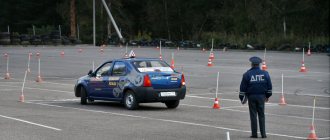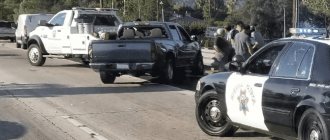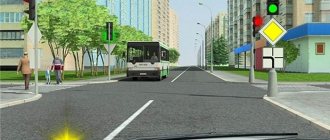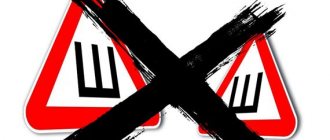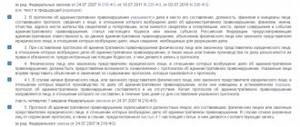Emergencies happen very often. The cause is driver inattention or technical problems with the car, poor climatic conditions and failure to comply with traffic rules by other drivers. Road accident disputes are a problem that needs to be resolved quickly. The victims must receive compensation, and the perpetrators must answer for the offense committed.
Despite the fact that before obtaining a license, drivers are required to undergo special theoretical and practical training, many have little understanding of how to behave after an accident in the incident analysis group at the traffic police. This is the issue that will be discussed in the article.
An advantageous offer from the partners of our portal - Terem Loan! Apply for a loan in the amount of up to 30 thousand rubles for a period of up to 30 days.
100% approval!
Get money
Why is accident analysis necessary?
When the causes of the accident and its culprit do not raise any questions for the traffic police inspector, then he simply writes a resolution on the administrative offense, right on the spot. Of course, there are cases when the investigation of an accident simply requires additional measures, or causes disagreements in determining the culprit, then the employee must draw up a report of the incident, and then all the materials on the case are sent to the district department of the traffic police, and the rest of the proceedings will take place there. All participants in an accident must sign a consent to appear for further analysis.
The investigation is being carried out by a special administrative practice group. The main task of the group is a detailed study of all events, and most importantly, the true causes of the accident. It will also be necessary to determine the degree of guilt of each participant. This procedure is simply necessary to ensure that the right decision is made and all the necessary documents are completed.
According to the article of the Criminal Code, the period for conducting an administrative investigation should be no more than one month from the moment the criminal case was initiated. There are rare cases when, at the written request of the investigator, it can be extended.
Only the head of a higher authority can extend the period. They mainly require an extension of the deadline when there are casualties in the accident. They are sent to undergo a medical examination in order to determine the full severity of the herbs that he received in the accident. This procedure takes a very long period of time.
Time limits for consideration of a case of an administrative offense
The case must be considered within fifteen days from the day the application, protocol and all other materials of the case were received. When two months have passed, all administrative material is written off.
Very often, those responsible for an accident believe that the correct way out of the situation would be to constantly hide from summonses under various pretexts and refuse to receive them. Because according to the code, the case can only be considered in the presence of the culprit. A person must know the exact time and place where the review of the case will take place. The offender often simply hopes that two months will pass and the case will be closed.
Read more: How to get new sample numbers
How does the analysis procedure take place in the traffic police?
All general requirements, set out in detail in the PPD, say that the very first actions of the driver after an accident should be as follows:
- The person must stop and immediately turn on a special alarm.
- Put up emergency signs.
- If there are victims, you need to call an ambulance.
- To call the police.
- All actions must be carried out without fail, otherwise it will simply not be possible to avoid the aggravation of the situation.
While the traffic police officers are waiting, people need to draw up a detailed diagram of the incident, and then record everything in a photo or video. If the participants are unable to form a clear picture of everything that is happening, and it is not possible to establish who exactly is to blame for the accident, then all further investigation will be carried out by the traffic police.
The whole point of the check is a detailed analysis of the event that occurred, and most importantly, the restoration of a complete picture of everything that happened. This procedure is carried out on the basis of a special resolution, and based on the results of the investigation, the culprit can be found.
Am I required to come to the traffic police or the court when summoned?
The obligation to attend the case and testify before the authorities depends on your status in this case and on the specific type of case: administrative or criminal.
If we are talking about administrative offenses, then in many respects this does not depend on the specific violation - even if we are not talking about driver violations or traffic matters in general, the law is the same for everyone, because it is regulated by the Administrative Code, only one chapter of which is responsible for fines and other traffic police penalties.
The Code of Administrative Offenses provides for the following participants in cases of violations:
- the person against whom the case is being conducted (hereinafter referred to as “LVOK” - an analogue of the accused in the Criminal Code) - it is precisely such a person who is most often obliged to appear at the traffic police or court and give evidence for questioning in the case in 2021, but most often he or she may not come at the request of the authorities,
- culprit - a person recognized by the relevant official or judge as having violated and who must be held accountable,
- witness,
- attesting witness
- victim,
- representative of a minor citizen.
There is still a status that is not directly stated in the code - the applicant, but we must also consider it in the context of the obligation to appear when called to testify.
Let's look at each of the listed participants individually!
LVOC
If you are accused of one or another violation of traffic rules or other Russian laws and regulations, then your presence is required during the consideration of the case. Such a consideration could be:
- analysis at the traffic police department, when an inspector caught you on the road, drew up a report, but postponed the consideration, since he was not authorized to consider certain violations or did not have the opportunity to consider here and now,
- court hearing - in case of violations of traffic rules, implying deprivation of rights or arrest as punishment; Such cases are considered only by the courts.
The direct obligation to come to the traffic police or court if you are summoned there is not stated anywhere, but part 2 of article 25.1 says that:
2. A case of an administrative offense is considered with the participation of a person against whom proceedings are being conducted for an administrative offense.
The exception is cases (same article) when the violation is recorded on an auto-recording camera - in this case, your participation is not required, and a decision with a fine by the traffic police is issued automatically.
But there is a significant subtlety - the Code of Administrative Offenses, indeed, says that the case cannot be considered without a criminal investigation, but the direct responsibility of traffic police officers or judges lies only in properly notifying such a person about the date, time and place of consideration (how they should properly notify citizens' bodies, we will discuss below). Your absence may therefore be acceptable in cases where:
- you have been duly notified,
- there have been no requests from you to postpone the case,
- if you filed such a petition, but the judge or traffic police officer rejected it.
But you will definitely be summoned to court or the traffic police if the case is about the imposition of an administrative arrest or if the judge or inspector considers your presence and testimony necessary for an objective and correct consideration of the case (Part 3 of Article 25.1 of the Administrative Code).
Meanwhile, if we are talking about the fact that you have already been called to the traffic police:
- the summons arrived
- you found a letter in your mailbox demanding that you appear and give evidence,
- you received a call to the traffic police or the court,
then, most likely, we are already talking about the fact that your presence is still mandatory. But in practice, in most cases, if you do not come when called and do not testify, then the case will be considered in your absence. But there is also a minority of cases when, for evading a summons for questioning, an interim measure may be applied to you - the so-called detention. We'll talk about it below.
You can find out exactly what you did and what violation you committed, if you don’t already know, even before the date of consideration of the case. Based on Part 1 of Article 25.1 of the Code of Administrative Offenses, LVOK has the right to familiarize itself with all case materials upon request.
Culprit
If a decision has already been issued against you with a fine or other punishment, but you are again summoned to the traffic police or the court, then either you may not appear, since you are no longer a participant in this case, or a new case has been initiated. Moreover, you may not be the person involved in it, but a witness, for example, or any other third party and then you are required to appear.
But most often you may be called if the employees themselves or the judge forgot something from the formalities: ask you to sign documents, request some documents from you, or, conversely, give them to you.
In this case, the easiest way is to immediately request the purpose of the call. If you have again become an LVOK in a new case, then even before considering it, you can familiarize yourself with the materials, referring to Part 1 of Article 25.1 of the Code of Administrative Offences.
Witness
A witness is any person who knows any information about a violation. Typically, witnesses are pre-recorded and are already known during the preparation phase of the case.
A witness is most often called to the traffic police or court for questioning and most often, for failure to appear, he can be brought in forcibly, unlike other persons. Although, the latter is still unlikely in absolute terms.
In addition, the witness is the only participant who faces something for not appearing when called by the traffic police or the court or giving false testimony during an interview - a fine of 1,000-1,500 rubles under Article 17.9 of the Code of Administrative Offenses.
The obligation of a witness to appear before the authorities to give evidence is expressly stated in Part 2 of Article 25.6 of the Code of Administrative Offenses, and it is impossible not to come when called.
Victim
If, for example, an accident occurs and a case is being considered regarding violation by the culprit, then you may be invited to a hearing or a court hearing as a victim.
Here, the legislation, as well as for LVOC, stipulates only that the case is considered with the participation of the victim, but the victim has no direct obligation to come when called by the traffic police or the court. But an important subtlety is that the victim is also a witness (Part 4 of Article 25.2 of the Administrative Code), and he can be forcibly summoned.
Witness
Another participant in administrative proceedings who is assigned the status of a witness by Part 5 of Article 25.7 by the Code. This means that the witness has all the obligations to come when invited to the traffic police or to court and give truthful testimony. If this is not done, there will be a fine.
Representative of a minor
Article 25.3 indicates that if minor citizens are involved in the case, then they are replaced by legal representatives during the consideration of the case. At the same time, the latter bear all the same responsibilities that their wards would bear if they were adults.
Thus, the legal representative:
- the witness is obliged to appear in court or at the traffic police department if he is called there for questioning and testimony; if he does not come, there will be a fine,
- The LVOK is also obliged to appear when summoned, but, unlike a witness, the case in his absence will be considered without him, unless the judge or employee considers the person’s participation mandatory,
- the attesting witness and the victim are liable if they do not appear when called, as well as the witness.
Complainant of Infringement
If you reported a violation through the official website or in writing - complained about another driver or pedestrian, then you may also be called to the traffic police to give explanations or testify about the case.
What are the consequences if you don’t come at such an invitation? There will be no liability for you as the complainant. You can also not appear before the authorities without fear of being forced to appear, since you are not a participant in the administrative case.
However, in the vast majority of cases in practice in 2021, in this case, according to your application, the violating person will not be prosecuted due to insufficient data about the violation (even if there is enough data). Unfortunately, this is the current practice.
How should you behave during an investigation at the traffic police?
Even if the damage is minor, both parties to the accident are still required to come for an analysis. There is no need to try to evade, because then there can be very serious consequences, namely, the person will simply be blamed for the accident, according to all the consequences.
If a person attends the hearing, he will be able to defend his rights with the help of various facts. Each participant in the analysis has every right:
- Request access to all case materials.
- Submit petitions.
- Testimony can be given in your native language, and an interpreter can be used.
- Demand any examinations, call witnesses and ask to attach them to the case.
- Record the entire procedure on a voice recorder.
- Use the services of a lawyer.
- Appeal the decisions.
After the results of the analysis, a decision is made, the person who is not guilty receives a certificate. All measures against the culprit can be applied only after a court decision.
All people want to know whether it is necessary to go to a debriefing after an accident. Then there are two solutions:
- If there is no dispute about the current situation, the inspector simply fills out a standard document.
- When disputes arise, then analysis is needed.
Time limits for investigations into road accidents
Consideration of a case of an administrative offense in the traffic police is a very complex and sometimes lengthy procedure. Such rules are based on the need to thoroughly check the causes of the accident, as well as establish all the circumstances of the case. Typically, the period for studying materials is 3-30 days , depending on the complexity of the case.
Under special circumstances and on the basis of Art. 28.5 and 28.7 of the Code of Administrative Offenses of the Russian Federation, the period can be extended to another month.
During this period, a group of experts performs a thorough analysis of the received evidence and evidence. Additionally, eyewitnesses are interviewed and video and photography are reviewed.
If there are injured persons as a result of an accident, they are first sent for a medical examination and then for treatment. A report on the physical condition of the victim is provided upon completion of the course. Taking into account the duration of this period, the period for consideration of an accident case can be extended to six months .
How is the procedure for analysis at the traffic police?
The general requirements set out in the traffic rules indicate that the driver’s first actions after an emergency involve:
- Stop and turn on the special alarm;
- Install emergency signs no closer than 15 meters from the car in the city and 30 meters on a country road;
- If there are victims, you need to call the rescue service at 112;
- Call the traffic police. If the accident is minor, then you can do without the police, but this is possible when the amount of damage is up to 100 thousand rubles.
All of the above actions are mandatory, otherwise it will not be possible to avoid aggravating the emergency situation.
While waiting for the state inspector, citizens should draw up a diagram of the incident, and then record what happened on video or photo. If there is no clear picture of what happened, and it is not possible to determine the culprit of the accident, then further investigation is entrusted to a special analysis group in the traffic police. The essence of the event is a thorough analysis of the event that happened and restoration of the full picture.
Read more: Field protection drawings
This procedure takes place on the basis of the relevant resolution and, based on the results of the event, the guilty person is identified. The events are called “administrative practice group” or “debriefing group”.
The culprit of the accident was not found: how to compensate for the damage
So, the culprit of the accident has not been found: what to do? It is clear that it is important not to become a violator yourself in an effort to find the culprit. But how can you get reimbursement if you don’t have an insurance policy?
Damage to health or life
If someone suffered damage to health or life during an accident, compensation will be paid, regardless of whether the culprit was found and whether he had an insurance policy. The Russian Union of Motor Insurers is responsible for this, first of all. What is needed to receive payment? The victim himself must contact this union with a statement. It is important to prove your damage with appropriate documents. If the victim dies, persons who have lost their breadwinner or have the right to compensation for funeral expenses may apply for compensation.
The culprit of the accident refuses to compensate for the damage. Read here what to do if the culprit of an accident is without compulsory motor liability insurance.
Find out what to do if the insurance company does not pay from the article:
Property damage
In this case, the culprit himself must compensate for the damage, if he is found. The damage can be assessed using an examination. Then you should invite the culprit to pay voluntarily. If it refuses, follow these steps:
- Contact the court to claim the amount of damages. Fill out your claim correctly and attach all the necessary documents. It is important that the court sees how you justify the amount required, as well as evidence that you are entitled to compensation for this damage. You can demand from the defendant not only the damage itself, but also the costs that you had to pay to go to court: state fees, funds for conducting an examination. After successful completion of the lawsuit, it is important to obtain a writ of execution.
- Contact the Federal Bailiff Service. Fill out an application and provide them with the received writ of execution. This body has access to the defendant’s property data, as well as his bank accounts. This way, you can speed up the process of receiving your compensation award. After this, the victim can simply wait until the required funds arrive in his account.
If the culprit was never found, but it became known who owned the car, the owner himself may bear responsibility. Of course, he is not to blame for the accident, but he continues to bear property liability.
He can be released from such liability only if he can prove that on the day of the incident he no longer owned the vehicle: the car was sold or stolen.
With the right actions and without making mistakes, you will be able to receive compensation, even if the driver tried to escape from the scene of the accident.
How to behave when analyzing an accident at the traffic police?
Even minor injuries received during an emergency cannot cause a citizen to fail to appear at the accident investigation team. This requirement should not be neglected, since ignoring it can cause serious consequences, namely, that the citizen will be found guilty of the accident with all the ensuing consequences.
Attendance at the hearing allows citizens to defend their case with the help of various arguments and factual evidence. If there are objective factors that do not allow you to take part in the analysis within the established period, you should submit a special petition to reschedule the event. Each participant in the procedure has the right:
- gain access to case materials;
- submit petitions and evidence;
- use the services of an interpreter and give testimony in your native language;
- demand examinations, call witnesses and attach additional certificates and extracts to the case;
- record the procedure on a voice recorder;
- involve a lawyer in the case;
- appeal the decision.
Based on the results of the analysis, an appropriate decision is made, and the innocent person receives an official certificate. All further actions and measures in relation to the culprit of the accident can be applied only after a court hearing and the adoption of an appropriate decision.
Is it necessary to attend a debriefing group?
No law or regulatory document provides for the mandatory appearance of participants in a collision for the consideration of their car accident at the administrative practice group of the traffic police department. If one of the drivers involved in an accident does not appear at the appointed time for the analysis group, then the case will be considered without his participation and a decision will be made.
Experts strongly advise against ignoring this important procedure. There are many examples when a driver, one hundred percent confident in his innocence, did not attend the debriefing group and was then unpleasantly surprised that it was he who was found to be at fault for a car accident with all the ensuing consequences.
By being personally present at the analysis of the traffic accident, the motorist will have the opportunity to defend his case by providing compelling arguments, additional materials or witness testimony. Of course, an unplanned event may occur in life that will prevent you from taking part in the analysis of a car accident on time.
In this case, the car owner can submit a request in advance to postpone the consideration of a specific accident by the administrative practice group of the traffic police department to another time. Of course, for a positive decision on such a request, it is necessary to indicate objective reasons that do not allow you to visit the debriefing group on a specific day.
In what cases is a traffic accident analysis prescribed?
Usually, participants in an emergency call traffic police officers in order to draw up all the necessary documents and identify those responsible for the incident. The inspector arrives at the scene and interviews all participants. After this, the police officer draws up a special protocol on the administrative violation, including drawing a diagram of the accident.
Many citizens are interested in whether it is necessary to go to a debriefing after an accident. There may be two solutions here. Let's look at each:
- If the causes of the emergency are obvious and there are no disputes regarding those responsible for the incident, the inspector will only have to draw up a standard document - a resolution on the administrative case;
- If doubts arise regarding the guilt of certain persons, a protocol is drawn up indicating the alleged culprit of the events, and then the document is transferred to the analysis group.
Each of the participants in the incident receives an official order to appear for the group at the State Traffic Inspectorate office. The document indicates the date and time of consideration of a specific case. If necessary, additional measures are assigned to investigate the incident on the road.
What to do if the second participant in the accident did not show up for analysis at the traffic police
No provisions of legislative acts provide for the mandatory attendance of all participants in an accident at the announced procedure. For this reason, if one of the participants does not appear in the debriefing group, this cannot be a reason for refusing to make a decision.
Personal presence during the analysis of the incident gives the participants additional opportunities: the accused - to try to prove his innocence, and the victim - to find out who is to blame for what happened.
Each participant has the right to submit a request to postpone the date of the event. In order for a positive decision to be made on a document, the reasons must be compelling.
